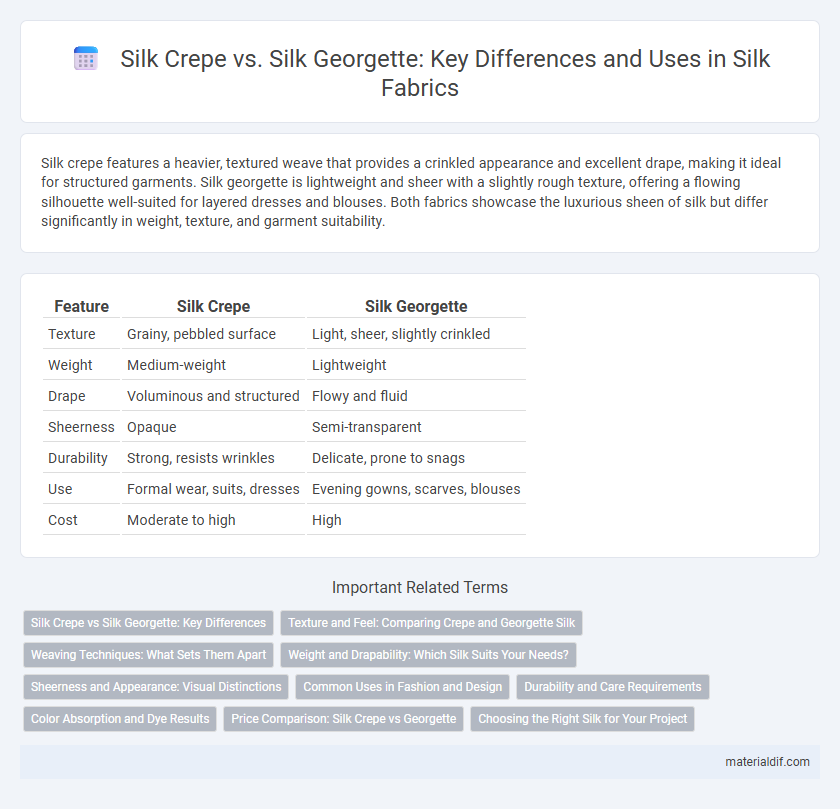Silk crepe features a heavier, textured weave that provides a crinkled appearance and excellent drape, making it ideal for structured garments. Silk georgette is lightweight and sheer with a slightly rough texture, offering a flowing silhouette well-suited for layered dresses and blouses. Both fabrics showcase the luxurious sheen of silk but differ significantly in weight, texture, and garment suitability.
Table of Comparison
| Feature | Silk Crepe | Silk Georgette |
|---|---|---|
| Texture | Grainy, pebbled surface | Light, sheer, slightly crinkled |
| Weight | Medium-weight | Lightweight |
| Drape | Voluminous and structured | Flowy and fluid |
| Sheerness | Opaque | Semi-transparent |
| Durability | Strong, resists wrinkles | Delicate, prone to snags |
| Use | Formal wear, suits, dresses | Evening gowns, scarves, blouses |
| Cost | Moderate to high | High |
Silk Crepe vs Silk Georgette: Key Differences
Silk crepe features a textured, crinkled surface created through tightly twisted yarns, offering a matte finish and substantial drape ideal for elegant garments. Silk georgette, characterized by its lightweight, sheer quality and slightly rough texture, provides a flowy, translucent appearance suitable for layering and delicate designs. The primary differences between silk crepe and silk georgette lie in their texture, weight, opacity, and drape, influencing their specific use in fashion and textile applications.
Texture and Feel: Comparing Crepe and Georgette Silk
Silk crepe features a crinkled, slightly rough texture that gives it a matte finish and a heavier drape, making it ideal for structured garments. In contrast, silk georgette has a lightweight, sheer texture with a soft, flowy feel and a subtle, grainy surface that lends itself to fluid movement in dresses and scarves. Both fabrics offer unique tactile experiences, with crepe emphasizing grip and body, while georgette prioritizes airiness and delicate softness.
Weaving Techniques: What Sets Them Apart
Silk crepe is woven using a tightly twisted yarn that creates a textured, crinkled surface, offering a heavier and more opaque fabric. In contrast, silk georgette is produced with a plain weave of loosely twisted yarns, resulting in a lightweight, sheer material with a slightly pebbled finish. The distinct weaving techniques affect the drape, weight, and texture, making silk crepe ideal for structured garments while silk georgette suits flowing, delicate designs.
Weight and Drapability: Which Silk Suits Your Needs?
Silk crepe is heavier and has a textured surface, providing a more structured drape ideal for tailored garments, whereas silk georgette is lightweight with a slightly sheer quality, offering a fluid and flowing drape perfect for airy dresses and scarves. The weight of silk crepe ranges between 70-100 grams per square meter, while silk georgette is typically lighter, around 40-70 grams per square meter. Choosing silk depends on the desired garment silhouette and comfort, with crepe suiting structured, voluminous styles and georgette excelling in soft, layered designs.
Sheerness and Appearance: Visual Distinctions
Silk crepe exhibits a crinkled texture with a slightly heavier drape, giving it a more opaque appearance compared to the lightweight and semi-transparent silk georgette. Silk georgette's sheer fabric creates a delicate, flowing silhouette ideal for layering, while silk crepe maintains a structured form with its matte finish. The visual distinction lies in silk crepe's subtle pebbled surface versus the fine, grainy texture of silk georgette, influencing their use in fashion and design.
Common Uses in Fashion and Design
Silk crepe, characterized by its crinkled texture and substantial weight, is commonly used in elegant evening gowns and tailored suits due to its excellent drape and structure. Silk georgette, with its lightweight, sheer, and flowy nature, is favored for blouses, scarves, and flowing dresses that require softness and movement. Both fabrics are popular in haute couture and bridal wear, but silk crepe provides more body while silk georgette enhances fluidity in fashion design.
Durability and Care Requirements
Silk crepe offers superior durability due to its tightly twisted yarns, making it more resistant to wear and abrasion compared to the delicate, lightweight texture of silk georgette. Silk crepe requires minimal care, often being more resilient to frequent washing and less prone to snagging, whereas silk georgette demands gentle hand washing or dry cleaning to maintain its fine, slightly sheer appearance. Proper handling prolongs the lifespan of both fabrics, but silk crepe is generally favored for everyday use due to its robust nature.
Color Absorption and Dye Results
Silk crepe exhibits superior color absorption due to its tightly twisted yarn and crinkled texture, resulting in rich, deep dye saturation and vibrant hues. Silk georgette, characterized by a looser weave and slightly sheer finish, absorbs dye more lightly, often producing softer, more muted color tones with a subtle shimmer. The differing fiber structures influence dye affinity, making silk crepe ideal for bold, intense designs, while silk georgette suits delicate, pastel color palettes.
Price Comparison: Silk Crepe vs Georgette
Silk crepe tends to be more expensive than silk georgette due to its heavier weight and intricate weaving process that enhances durability and texture. Georgette, being lighter and with a looser weave, generally costs less and is preferred for flowy, semi-sheer garments. Price differences also reflect the quality of raw silk and finishing techniques, with crepe often commanding higher prices in luxury markets.
Choosing the Right Silk for Your Project
Silk crepe offers a textured surface with a slightly heavier weight, making it ideal for structured garments like dresses and blouses that require crisp draping. Silk georgette is lighter, sheer, and more fluid, perfect for flowing silhouettes and layered designs. Selecting the right silk depends on the desired garment structure, with crepe providing durability and georgette offering softness and movement for delicate, airy fabrics.
Silk crepe vs Silk georgette Infographic

 materialdif.com
materialdif.com